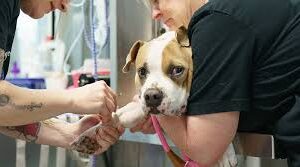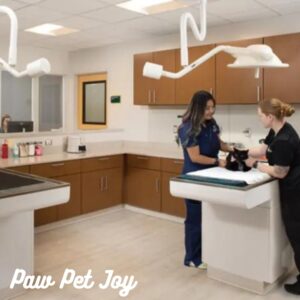Emergency Vet & Specialty Care comes in – a facility dedicated to providing 24/7 emergency veterinary services and specialized care for pets in need.
Introduction:
Emergency vet: Accidents and sudden illnesses can happen at any time, leaving us feeling helpless and desperate to find the best care for our beloved companions.
Whether your pet has been injured in an accident, experiencing a sudden illness, or facing a medical emergency outside of regular business hours, Best Emergency Vet & Specialty Care is there to help. Their team of experienced and compassionate veterinarians is equipped to handle a wide range of emergency situations, providing diagnostic testing, surgery, intensive care, and specialized treatments to give your pet the best chance at a full recovery. With state-of-the-art facilities and round-the-clock care, you can trust that your pet is in good hands at Best Emergency Vet & Specialty Care.

- Understanding the importance of emergency vet care
- Services offered by emergency vet clinics
- The difference between emergency vet care and regular veterinary care
- How to find the best emergency vet in your area
- Tips for preparing a emergency vet
- Importance of having a 24/7 emergency vet on call
Understanding Emergency vet
Veterinary emergencies can arise suddenly and can be life-threatening. Here are some common situations that require immediate veterinary attention:
Trauma: This includes car accidents, falls, bites from other animals, or any injury that results in severe bleeding, broken bones, or inability to move.
Severe Vomiting or Diarrhea: Persistent vomiting or diarrhea can quickly lead to dehydration and can be a sign of a serious underlying condition.
Breathing Difficulties: Any difficulty in breathing, including choking, persistent coughing, or labored breathing, is a critical emergency.
Seizures: Repeated seizures or a seizure lasting more than a few minutes is an emergency.
Unconsciousness or Collapse: If your pet suddenly collapses or loses consciousness, immediate veterinary care is essential.
Toxin Ingestion: Ingestion of toxic substances like chocolate, antifreeze, certain plants, or medications requires urgent care.
Services offered by emergency vet clinics
Having access to a reliable emergency vet clinic that offers 24/7 care is essential for pet owners. These clinics are equipped to handle a wide range of urgent medical situations, from sudden illnesses to traumatic injuries.
One of the main services offered by emergency vet clinics is immediate medical attention for pets in need. This includes diagnosing and treating conditions such as poisoning, respiratory distress, seizures, heatstroke, and sudden collapses. The team of skilled veterinarians and technicians at these clinics are trained to handle emergencies with speed and precision, ensuring that pets receive the care they need as quickly as possible.
This can include advanced diagnostic imaging such as X-rays, ultrasounds, and MRIs, as well as specialized procedures such as endoscopy, surgery, and chemotherapy. Having access to these services can be crucial for pets with serious illnesses or injuries that require a higher level of care.
Another important service offered by emergency vet clinics is intensive care for critically ill or injured pets. This can involve round-the-clock monitoring and treatment for pets in critical condition, such as those with severe infections, organ failure, or traumatic injuries. The clinic’s dedicated staff will work tirelessly to stabilize your pet and provide the best possible chance for recovery.
In addition to medical care, many emergency vet clinics also offer support and education for pet owners. This can include guidance on how to recognize signs of illness or injury in pets, as well as information on preventive care and emergency preparedness. By arming pet owners with knowledge and resources, these clinics help ensure that pets receive the best possible care both in emergencies and in everyday life.

Emergency vet clinics also play an important role in the community by partnering with local animal shelters, rescue organizations, and law enforcement agencies to provide care for stray or injured animals. These clinics often have relationships with animal control officers and other first responders, allowing them to coordinate efforts to rescue and care for animals in need.
The difference between emergency vet care and regular veterinary care
Regular veterinary care is the ongoing care that your pet receives for routine check-ups, vaccinations, and preventive care. On the other hand, emergency vet care is required when your pet is facing a sudden and serious medical issue that needs immediate attention.
Regular veterinary care typically involves scheduled appointments with your veterinarian for things like wellness exams, dental cleanings, and vaccinations. This type of care focuses on maintaining your pet’s overall health and preventing any potential health problems. It is important to stay up to date on these visits to ensure that your pet stays healthy and happy.
Emergency vet care, on the other hand, is necessary when your pet is experiencing a medical emergency that cannot wait for a regular appointment. This could include things like injuries from accidents, ingestion of toxic substances, or sudden illness. These situations often require immediate attention to prevent further complications or even save your pet’s life.
One of the main differences between regular veterinary care and emergency vet care is the urgency of the situation. With regular veterinary care, you typically have the luxury of scheduling appointments in advance and planning for routine procedures. Emergency vet care, on the other hand, requires immediate action and often occurs outside of regular business hours. This is why it is crucial to have a plan in place for emergency situations and know where to go for quick and reliable care.
How to find the best emergency vet in your area
Finding the best emergency vet in your area is crucial for ensuring the health and well-being of your beloved pet. Whether your pet is showing signs of illness or has been involved in an accident, having access to quality emergency veterinary care can make all the difference in their recovery.
One of the most effective ways to find the best emergency vet in your area is to ask for recommendations from friends, family, or other pet owners. Word of mouth can be a powerful tool when it comes to finding a reliable and trustworthy emergency vet. If someone you know has had a positive experience with a particular emergency vet, chances are you will too.
Another way to find the best emergency vet in your area is to do some research online. Most emergency vet clinics have websites where you can learn more about their services, staff, and facilities. Reading online reviews from other pet owners can also give you a better idea of what to expect from a particular emergency vet clinic.
Ideally, you will want to choose an emergency vet clinic that is conveniently located and open 24/7, so you can access care for your pet at any time of day or night. It’s also important to make sure that the emergency vet clinic offers a wide range of services, including diagnostic testing, surgery, and intensive care.

Tips for preparing a emergency vet
Finding yourself in a situation where your pet needs emergency care can be stressful and overwhelming, but having a plan in place can help alleviate some of the anxiety. Here are some tips for preparing for an emergency vet visit:
It is crucial to find a reliable emergency vet clinic in your area. Take the time to research and visit different clinics to see which one you feel most comfortable with. Look for a clinic that is open 24/7 and has experienced veterinarians on staff who specialize in emergency care. It is also a good idea to read reviews from other pet owners to get an idea of the clinic’s reputation.
Once you have chosen an emergency vet clinic, make sure to save their contact information in an easily accessible place. This could be on your phone, in a notebook, or on the refrigerator. It is important to have the clinic’s phone number and address readily available so you can quickly contact them in case of an emergency.
Another crucial step in preparing for an emergency vet visit is to create a pet first aid kit. This kit should include basic supplies such as bandages, gauze, antiseptic wipes, scissors, and tweezers. Having these supplies on hand can help you provide temporary care for your pet until you can get them to the emergency clinic.
It is also important to have a plan for transportation in case of an emergency. Make sure you have a carrier or leash readily available to safely transport your pet to the vet clinic. If your pet is injured or unable to walk, consider having a plan in place for how you will safely move them, such as using a blanket or stretcher.
By following these tips and being prepared for any emergencies that may arise, you can ensure that your pet receives the care they need in a timely manner. Remember, being prepared is the best way to handle unexpected situations and ensure the health and safety of your beloved pet.
Importance of having a 24/7 emergency vet on call
Emergencies can happen at any time of day or night, and having a trusted veterinarian on call can make all the difference in the world for your beloved pet.
When it comes to our pets, we want to ensure that they receive the best care possible, especially in times of crisis. Emergencies such as accidents, sudden illnesses, or complications from pre-existing conditions can occur at any moment. In these situations, having a reliable emergency vet to turn to can provide peace of mind and potentially save your pet’s life.
In emergency situations, time is of the essence. Being able to quickly get in touch with a 24/7 emergency vet can mean the difference between a positive outcome and a tragedy. Delaying treatment can lead to further complications or even death for your pet. Having a vet available at all hours ensures that your pet can receive immediate care when they need it most

.
What to Expect at an Emergency Vet Clinic
Emergency vet clinics are equipped to handle a wide range of urgent health issues. Here’s what you can typically expect when you arrive:
Initial Assessment: Upon arrival, a veterinary technician will quickly assess your pet’s condition to determine the severity of the emergency.
Triage: Similar to human emergency rooms, pets are treated based on the severity of their condition. Life-threatening cases are prioritized.
Diagnostics: Depending on the condition, the vet may perform blood tests, X-rays, ultrasounds, or other diagnostic tests to determine the best course of action.
Treatment: Treatment can range from administering medications, providing oxygen, performing surgery, or hospitalizing the pet for intensive care.
Communication: The vet will keep you informed about your pet’s condition, the recommended treatments, and the estimated costs involved.
How to Be Prepared
Being prepared for a veterinary emergency can help ensure the best possible outcome for your pet. Here are some tips:
Know the Location : Identify the nearest 24-hour emergency vet clinic and keep their contact information handy.
Pet First Aid Kit : Have a first aid kit specifically for pets, including items like gauze, bandages, antiseptic wipes, and a digital thermometer.
Recognize the Signs : Familiarize yourself with the signs of common emergencies so you can act quickly.
Pet Insurance : Consider pet insurance to help cover unexpected emergency costs.
Keep Calm : In an emergency, staying calm can help you think clearly and provide comfort to your pet.
Q1: How do I know if my pet’s condition is an emergency?
A: Look for signs like severe bleeding, difficulty breathing, persistent vomiting or diarrhea, seizures, or sudden collapse. If in doubt, it’s better to err on the side of caution and consult an emergency vet.
Q2: What should I do if my pet ingests something toxic?
A: Immediately contact an emergency vet or a pet poison hotline. Do not induce vomiting unless instructed by a professional.
Q3: Can I give my pet human medications in an emergency?
A: No, many human medications are toxic to pets. Always consult a vet before administering any medication.
Q4: How can I transport my injured pet safely?
A: Use a blanket or a sturdy box to support your pet and keep them still. Avoid unnecessary movements that could exacerbate their injury.
Q5: What information should I provide to the emergency vet?
A: Be ready to provide details about your pet’s medical history, any current medications, and the circumstances leading up to the emergency.
- Trauma, severe vomiting or diarrhea, breathing difficulties, seizures, unconsciousness, and toxin ingestion are common veterinary emergencies.
- Emergency vet clinics provide triage, diagnostics, treatment, and intensive care based on the severity of the condition.
- Being prepared with knowledge, a first aid kit, pet insurance, and the location of the nearest emergency vet clinic can significantly improve outcomes.
Conclusion
Emergency vet situations are stressful and can be frightening. However, understanding what constitutes an emergency, knowing what to expect at the emergency vet clinic, and being prepared can make a significant difference in your pet’s health and well-being. Always consult a veterinarian when in doubt, and prioritize your pet’s safety and health.

Nice